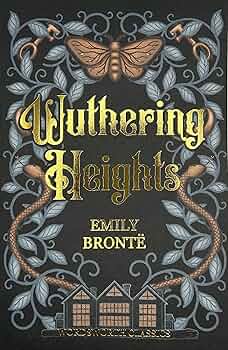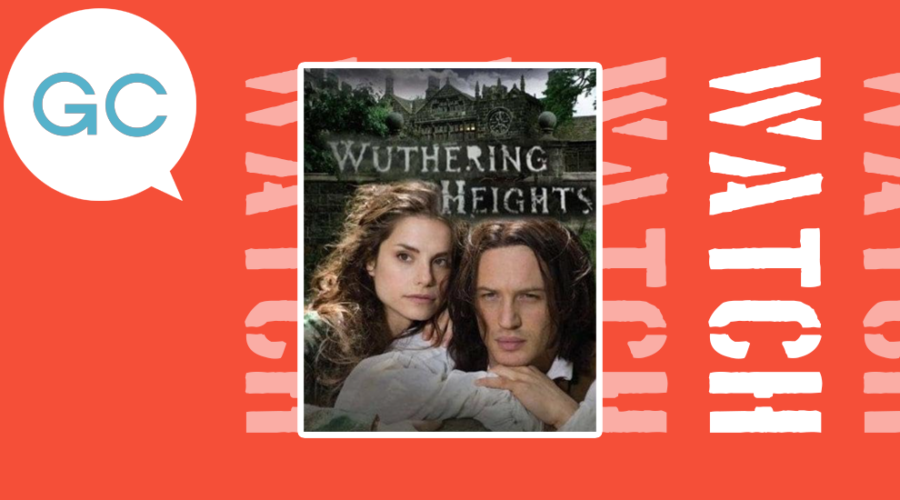This month over at Five Books For, we’re discussing gothic-ish classics, given that it’s October. I know lots of us go in for reading or watching something spooky around this time of year in honour of Halloween and I thought that this year it would be interesting to take a look a some of the books that helped to create and define some of the modern genres that we read around now, with a focus on gothic classics.
Where better to look than one of the original ghost stories, a tragic tale of doomed love and epic revenge?
 Yes, I’m talking about Wuthering Heights by Emily Brontë.
Yes, I’m talking about Wuthering Heights by Emily Brontë.
Often described as one of the greatest love stories of all time, Wuthering Heights follows the story of Catherine and Heathcliff through a turbulent love affair, which turns into an epic tale of revenge.
As a child, Heathcliff is found on the streets of Liverpool by the kindly Mr. Earnshaw and brought home to Wuthering Heights, his large Yorkshire home, to be adopted into the family. Mr. Earnshaw has two children already, Catherine and Hindley, and while they are both initially wary of Heathcliff the relationships soon grow into a mutual hatred between Heathcliff and Hindley, even as Heathcliff and Catherine fall in love. Mr. Earnshaw favours Heathcliff, which inflames the situation further.
When Mr. Earnshaw dies, Hindley inherits Wuthering Heights and returns with his wife Frances, banishing Heathcliff to work as a labourer on the estate. While out one evening with Heathcliff, Catherine is bitten by the dog of their neighbours, the Lintons at Thrushcross Grange, and as a result ends up having to stay there to recuperate while Heathcliff returns to Wuthering Heights.
When she finally returns home, she is infatuated with Edgar Linton and much more aware of her social class and Heathcliff’s less certain place in the social hierarchy of their milieu.
Matters begin to come to a head when Frances dies giving birth to a son called Hareton, which sends Hindley into a downward spiral of alcoholism and grief and increases the cruelty of his behaviour towards Heathcliff. When Catherine gets engaged to Edgar Linton despite her love for Heathcliff, Heathcliff runs away.
He returns shortly after the marriage takes place, suddenly and mysteriously wealthy and determined to exact revenge. I won’t give too much away but suffice to say, his revenge is well-planned, thorough, and goes far beyond his original grudges to affect the next generations of the Earnshaw and the Lintons, wreaking destruction and ruining lives, including his own.
As a novel, Wuthering Heights has atmosphere in spades and lots of drama. It’s also a thoughtful exploration of some deep themes, especially social class and revenge, but also sibling rivalry, the cost of cruelty, the unintended consequences of good deeds and the legacy of generational trauma.
The plot is compelling and makes you empathise with the characters even when they’re at their most cruel and self-destructive. The landscape of the Yorkshire moors is almost a character in its own right and the wildness of the moors seems to permeate the whole book somehow. I especially love books with a strong sense of place and I think this might be the Ur-example.
When it was first published, Wuthering Heights was considered startlingly original but also strange and baffling. It took decades for it to begin to be considered the best of the novels written by the Brontë sisters and it has inspired many other works of art, not least the Kate Bush song of the same name – I’m not sure if any other classic novel can claim to have inspired a chart-topping hit song.
The passion leaps off the page and pulls you in and the futility of Heathcliff’s revenge is something you really feel. I first read it as a teenager and I think there is something immature about Cathy and Heathcliff’s love story despite the fact that it lasts all their lives; they never seem to grow out of either their passion for each other or find a way to live with it healthily.
I’m not sure it reads well as a love story. Both Catherine and Heathcliff are in many ways awful characters and their behaviour is rarely truly loving; in some ways they have more in common with vampires – not the sexy modern kind, but the traditional kind who suck everything dry and drain the life from everything around them.
I think it’s perhaps easier to understand the story as an inversion of a love story, despite the love at the centre of it. Luckily the younger generation of the two families provides some hope and contrast so that while there’s plenty of tragedy and cruelty to go around, there’s also hope at the end.
Wuthering Heights TV adaptation
Wuthering Heights has been adapted many times for both film and TV, and for our purposes today I’ll be focusing on the 2009 TV adaptation which has an all-star cast including Sarah Lancashire, Tom Hardy and Andrew Lincoln.
One of the things I love about the adaptation is how it tells the story in chronological order (except for a few minutes at the beginning, which effectively function as a prologue); the novel has a format and structure which works for a novel but which wouldn’t work so well on-screen.
The acting is brilliant – Tom Hardy makes a compelling Heathcliff who has flashes of humanity even when at his most cruel, while Charlotte Riley is excellent as Catherine, with all of her spoiled impetuosity and selfishness. (As an interesting aside, they are now married and apparently this is where they met). Sarah Lancashire is always good, whatever she’s in, and I think she gets the balance of Nelly just right, and Andrew Lincoln makes Edgar Linton into a sympathetic and more rounded character than we see in the book. The cast in general were great and the set and costume design in particular really help to bring the story to life.
I do think they could have made more of the setting given how essential it is to the novel. While we get glimpses of it, it doesn’t feel like a character or even a huge presence the way it does in the book, even though the characters refer to it a lot.
There is some razor-sharp drawing room dialogue in the script, which is delivered perfectly by Hardy in particular. To me, this is the perfect adaptation for anyone who wants to get a better grip on the events in the story, especially if you found the structure of the novel confusing, but it’s also worth watching as a standalone if you feel like you don’t have the time or effort to give the novel – although truly, please read it – it’s considered one of the greatest books ever written for good reason.
I’d love to hear what you thought of the book or the adaptation, or indeed any of the other adaptations – is there a better one we should be seeking out? Let us know on our social channels!

